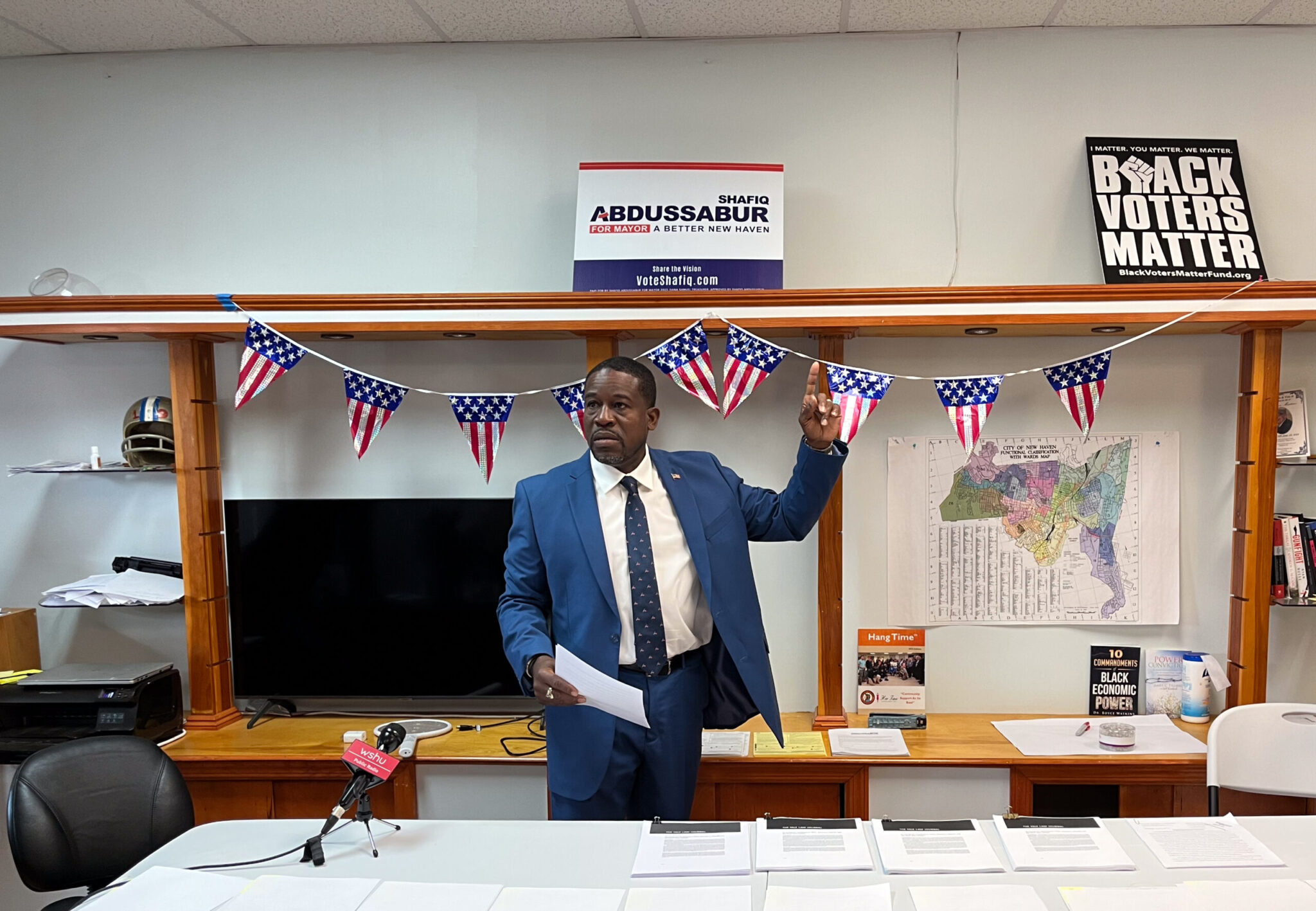Mayoral candidate fails to make Democratic Primary ballot after lawsuit dismissed in court
Abdussabur’s campaign presented a full list of petition signatures he argues were unfairly tossed out and demanded Connecticut amend its petition verification process at a press conference last week.

Hannah Kotler, contributing photographer
Mayoral candidate Shafiq Abdussabur saw his attempt to qualify for the Democratic primary ballot fail in court last week.
Superior Court Judge Paul Doyle dismissed Abdussabur’s lawsuit on Aug. 29. The Abdussabur campaign filed a lawsuit against Democratic Registrar of Voters Shannel Evans and City Clerk Michael Smart after they disqualified Abdussabur from the primary ballot for New Haven mayor for failing to acquire enough signatures. The Abdussabur campaign hosted a press conference Thursday afternoon where he questioned the validity of the petition verification process of Connecticut’s Registrar of Voters.
“We found gross inconsistencies around the process,” Abdussabur claimed in the press conference.
The defense filed a motion to dismiss Abdussabur’s complaint. Following an online hearing on Aug. 28, Doyle issued a memorandum explaining his decision to dismiss the suit due to the Purcell doctrine, a principle named for the 2006 Purcell v. Gonzalez Supreme Court case that prohibits courts from interfering in ongoing elections.
“In the present case, the Democratic primary election of September 12, 2023, began when Smart printed and made absentee ballots available on August 22, 2023,” Doyle wrote in the memorandum. “With voting already having begun and election day approaching, the Purcell principle is applicable to the present case.”
At the press conference, Abdussabur shared the results of an internal audit that he claims found over 1,623 valid signatures, which would qualify him for the primary ballot. The campaign displayed 10 pages of petition signatures to prove what they argue shows a lack of transparency at the Democratic Registrar of Voters. The campaign stated they will not appeal the court’s decision but instead pressed for the development of a fair process at the registrar’s office.
Patricia Kane, the attorney representing Abdussabur, urged press conference attendees not to blame the campaign for failing to get on the ballot.
“This is a failure of the process in Connecticut… an inconsistent standard was applied, which means no standard was applied,” Kane said.
According to Abdussabur, the campaign submitted over 2,700 petition signatures from registered Democratic voters in New Haven, exceeding the 1,623 signatures a candidate requires to qualify for the primary ballot. The Democratic Registrar of Voters counted only 1,406 valid signatures. Abdussabur pointed to specific pages where the registrar counted fewer signatures or rejected entire pages where his campaign found valid signatures.
Abdussabur stated that the registrar did not mark which signatures were rejected and did not give a specific reason for their rejection.
“These are the things that I believe when you don’t make available to the public, this is why people don’t want to vote, this is why people lose faith in government,” Abdussabur said.
Evans did not respond to a request for comment.
Kane added that there is no way to fact check the registrar and suggested an alternate ballot qualification system where candidates could pay a “small fee” to be on the ballot.
The campaign did not get the chance to present pages of petition signatures in court since the lawsuit was dismissed.
At the press conference, Abdussabur admitted that approximately ten petition pages were improperly filled out, and one hundred signatures were not from New Haven residents, but denied that any signatures were illegible or had invalid addresses.
Kane also spoke about the implications of the judge’s decision to apply the Purcell doctrine. She argued, citing a Yale Law Journal article, that the Purcell doctrine is a Supreme Court emergency ruling used predominantly in the American South and West as a tool supporting voter suppression.
“I think Connecticut legislators have to take a hard look at whether [the ruling] advances democracy,” Kane said. “Does it aid candidates in getting on the ballot, or is it just a barrier… It’s completely narrowing the window, in the entire process in which a person who has a genuine complaint can seek a remedy. It’s devastating, it’s visceral.”
Abdussabur has submitted enough signatures to qualify for the Nov. 7 general election ballot as an unaffiliated candidate, but said he is assessing whether he will continue the campaign.
“We are still evaluating the viability of our run for November based on this outcome,” Abdussabur concluded.
Abdussabur’s campaign headquarters is located at 347 Whalley Avenue.







